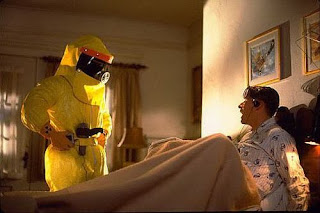Because, really. Who doesn't have the time--or extra column inches--to do a little modernism-hating?
Review: Carlsbad Music Festival 'L.A. Satellite Concert', Josef Woodard, L.A. Times ("blogs"), September 24, 2009
It may be too soon and too hyperbolic to declare Carlsbad as a new hotbed of contemporary classical music action.
First, is "classical music action" better or worse than classical music? Different? Is it, like, concerts and stuff?
Also, the rhetorical force of hyperbole is diminished when you point it out to your reader.
But as the sixth annual Carlsbad Music Festival unfolds this weekend featuring new music notables the Calder String Quartet, the California E.A.R. Unit and guitarist-composer-conceptualist Fred Frith, clearly something is abuzz in the seaside town, at least for one weekend each year.
One weekend a year? Yeah, I'd say that does not qualify as a hotbed of "classical music action." So, in fairness, describing it thusly would be an excellent use of hyperbole. Alternately, I suppose, you could just write that writing a hyperbole would be hyperbolic.
Founded and nimbly run by young composer-violinist Matt McBane, the festival provides a fresh West Coast forum for new music, commissioned, performed and served up with seriousness as well as audience accessibility.
Ah, they provided wheelchair ramps and enhanced hearing devices.What? No?
They "served up...audience accessibility?" I bet I hope that doesn't mean what I hope I bet it means.
As a more urbanized festival harbinger, Wednesday at Zipper Hall, an “L.A. Satellite Concert” offered a taste of what is to come this weekend. The program of four pieces was evenly divided between ink-still-wet world premieres and past CMF commissions, testimony to the festival’s growing feeling of a continuum.
At least the harbinger was recursively doing its job as a taste of what is to come (and other cumbersome redundancies).
[sings a little song] The next paragraph is my faaa-vorite!
While the pieces at the Zipper differed, a general aesthetic spirit here accentuated modes of contemporary music relatively free of harsh or dissonant elements, except as points of tension in carefully constructed conceptual schemes. In other words, this was ear-friendly contemporary music, without the intellectual factors often alienating to audiences disinclined toward old school Modernism.
Ha ha! Awesome. Let's do it again, with feeling.
While the pieces at the Zipper differed,
ZOMG you guys! The pieces...were different pieces? Better put that in the review [types furiously and earnestly].
...a general aesthetic spirit here accentuated modes of contemporary music relatively free of harsh or dissonant elements, except as points of tension in carefully constructed conceptual schemes.
Man, Americans love a good challenge, don't we?
Basically, there wasn't really any "harsh or dissonant" music on the program, so the strategy is to present the virtues of the music that was played as a lack of something not present. That's a great selling point. Because, hey: the oatmeal may be bland, but at least it didn't taste like poison!
Figure 2: xkcd is most excellent.
In other words, this was ear-friendly contemporary music, without the intellectual factors often alienating to audiences disinclined toward old school Modernism.
Yeah. So Charles Ives and I think that sucks.
 Figure 3: "If a composer has a nice wife and some nice children, how can he let the children starve on his dissonances?"
Figure 3: "If a composer has a nice wife and some nice children, how can he let the children starve on his dissonances?"
Sure, it's fine if some people are "disinclined toward old school Modernism," but why propogate that (frankly) small-mindedness while promoting a product (and, yes, that's what it is) that doesn't, really, have anything to do with that?
 Figure 4: Free of harsh or dissonant elements (except in the service of its carefully constructed conceptual scheme), The Runaway Bunny offers all the Happy Fuzzy Bunny Story Time you're looking for without the intellectual factors often alienating to audiences!
Figure 4: Free of harsh or dissonant elements (except in the service of its carefully constructed conceptual scheme), The Runaway Bunny offers all the Happy Fuzzy Bunny Story Time you're looking for without the intellectual factors often alienating to audiences!The problem isn't that some contemporary music is more-or-less consonant. The problem isn't that some people don't like Ives (or Mann, or Eisenstein, or Kandinsky, or Pound).
The problem is the persistent propagation of the Myth of the Awful Modernist Music, particularly when bought wholesale and sold at a generous markup to a public reading an article that has nothing whatever to do with the music you're disparaging.
Is this sort of like why Coke and Pepsi still spend billions of dollars on advertising annually? Somewhere, someone hasn't heard that a) it's not 1932, b) music (and, astoundingly, most of the rest of the world) isn't like it was in 1932?
"HEY! EVERYONE! I'm writing an article about particle accelerators and their potential applications in the field of theoretical physics! Oh, and FUCK SCHOENBERG!"
Gaaaah!
So, great. Take your carefully-pointed-out hyperboles and your fuzzy bunny music and slag off to Carlsbad and get paid to write words for money. I don't care. Just don't drag so-called "intellectual" music through the mud while you're at it. It's not really within the purview of what you're talking about, and it does a disservice to other, perfectly valid kinds of art and expression.
Josef Woodard: You're not helping.





































